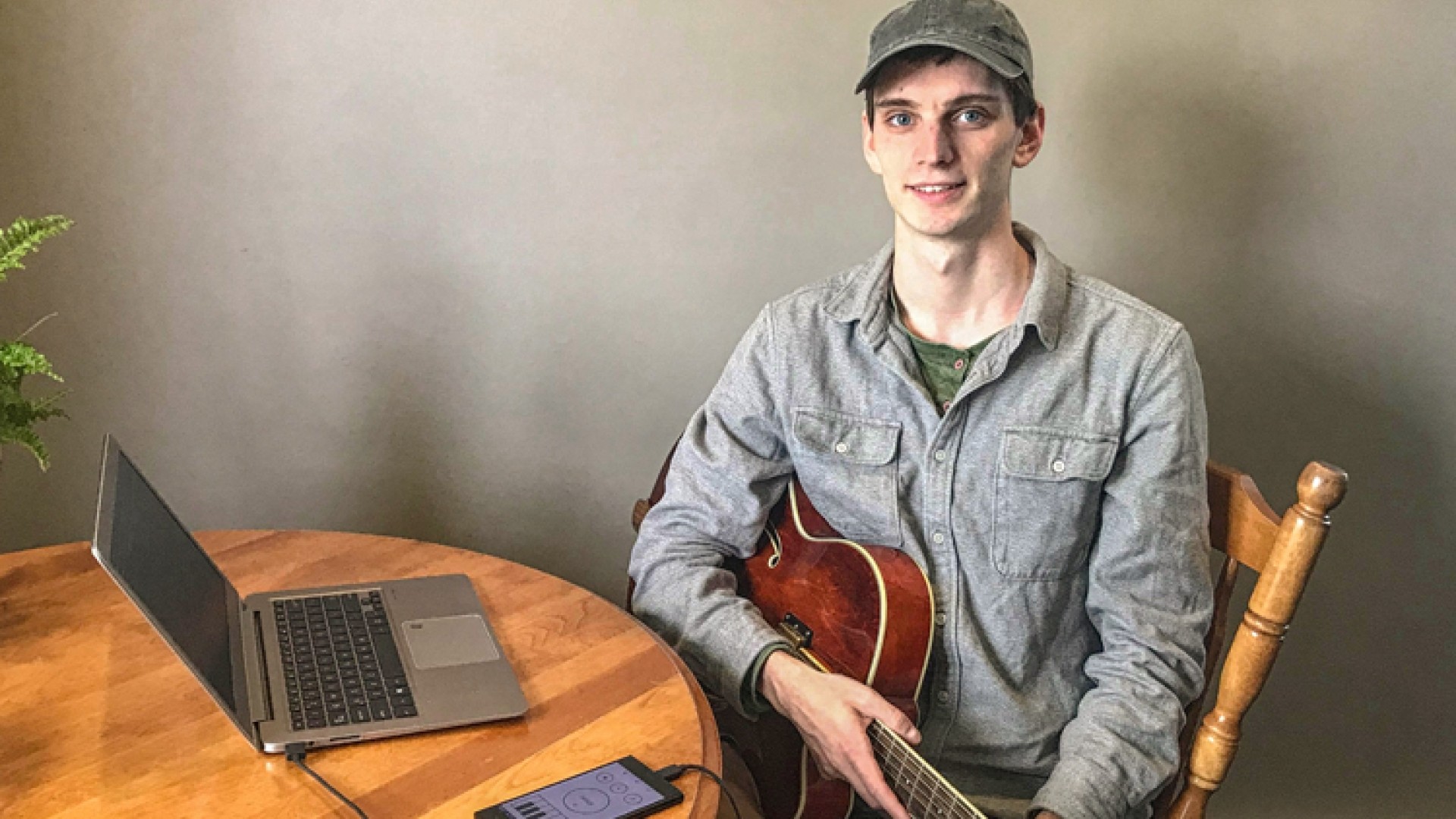
Summer research work conducted at StFX on an app that combines music and computer science to help assist musicians practicing their instrument—the app listens to the user play and matches the key—has proved so successful for undergraduate student Travis MacDonald of Greenhill, NS, that he will present his work at a prestigious international conference.
Mr. MacDonald conducted the research last summer in the StFX Computer Science Department under the supervision of Dr. James Hughes.
Mr. MacDonald wrote a scientific article from the work, which was accepted for publication in a top international venue, New Interfaces in Musical Expression (NIME), and he was invited to present a poster at a conference that was scheduled to take place at the Royal Birmingham Conservatory, Birmingham, UK. He was also awarded funds through StFX’s James Chair student travel program to attend. Unfortunately, due to COVID-19, the conference has since transitioned online. Mr. MacDonald will participate virtually.
“It feels pretty cool to be part of a conference of this level,” Mr. MacDonald says. “Music and computer science is a niche field, so to have all these experts condensed into the same place is pretty special.”
NIME, he says, encompasses all kinds of areas in which computers can forge new ways to explore musical ideas.
“I’m looking forward to seeing what people are doing, as I’m sure there are specific areas that I’m unaware of. I’m hoping to walk away with some new ideas to think about.”
The conference takes place July 21-25th and will be modeled after an in-person conference, consisting of paper and poster presentations. The paper presentations will be pre-recorded and streamed at specific times, followed by Q&A’s. The poster presentations will be linked from their website during the conference. “We are encouraged to be creative, considering the circumstances, so we are thinking of making a poster with embedded videos to make it a bit more interactive.”
SOMETHING REMARKABLE
“The work Travis did last summer really is something remarkable,” Dr. Hughes says. “Not only do his achievements speak to the quality of the work, but the project was entirely done by him. I provided very little guidance and Travis independently worked out the problem and implemented the software. To me, this really highlights his abilities and speaks to the maturity level of our CS students here at StFX. Further, it’s really great to see what happens when talented students are given the opportunity and resources to work on what they find interesting; this is the type of work that doesn’t get done without these unique research opportunities.”
Mr. MacDonald says once the project to create a tool that provides interactive musical accompaniment started to get off the ground last year, Dr. Hughes found some conferences that seemed liked a good fit. “Of those, NIME sounded the most relevant, so we aimed for that one first. We submitted the paper in January, and just recently found out it was accepted as a poster presentation.”
Mr. MacDonald says he got into music at a young age and was fortunate to have some great teachers along the way. “However, computer science is brand new to me. Fortunately, the intersection of those fields aligned with some of James’ ideas and it pretty much started from there. I’m beginning to understand how computers can work with music, especially with the rise of machine learning, and potentially come up with new solutions to current problems in the field,” he says.
“The work from last summer is just one step in that direction. I’m looking forward to continuing that research.”
Mr. MacDonald, who would like to get into the software industry after StFX, says the computer science program at the university offers a wide range of courses, so students get exposed to many different areas.
With his research last summer, he focused on a single area the entire time. “You really get a chance to go deep into a topic this way,” he says. “In my case, I got some real hands-on experience in conducting research and writing software. Although my project was small and simple, I got a sense of the research process, and I’m looking forward to doing it again this summer.”
Mr. MacDonald was again awarded summer research funding, this year in the form of the Alley Heaps Undergraduate Research Internship Award. The focus of this work is on machine learning and music—seeing if they can get artificial intelligence to generate some satisfactory sounding music, and then studying exactly how it did this. “Hopefully, this leads to some discovery about underlying rules and relationships between different types of music,” he says.
This research is, in part, made possible by the Government of Canada Research Support Fund.

